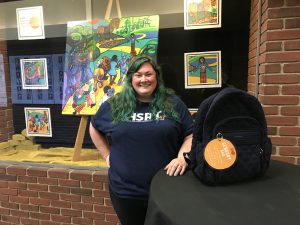People with autism or other developmental differences can now experience Hope Summer Repertory Theatre in more welcoming, safe and comfortable ways thanks to new resources that make theater-going more sensory-friendly. A year in the making by HSRT Associate Managing Director Reagan Chesnut ’08, the initiative clearly sends the message that live, immersive theatre is accessible for all.

“Accessibility for theatre has always been something that’s really important to me,” says Chesnut. “I have family members who have autism and sensory-related disabilities so I was trying to figure out how to pull them into this world that has dark lights and loud noises. Creative play is so important to the human spirit so being able to come see theatre is very important. For any and everyone.”
Chesnut researched to create tools that would help those with autism and developmental differences. She also consulted with Benjamin’s Hope, a Holland-based “live, work, play, worship” organization designed to address the multifaceted needs of adult individuals and families affected by autism and other intellectual and developmental differences. The result is the creation of a three-prong approach to theatre accessibility: Sensory bags, “Going to the Theatre” social stories, and performance guides for use before and most HSRT productions.
“Social stories” is a term used to describe documents that improve the social skills of people with autism and developmental difference. They tell a “story” of appropriate social interaction by describing a situation with relevant social cues, other’s perspectives and a suggested appropriate response.
“The hope is that people go to our website if they want to have a little bit more time to look over the social stories or performance guides prior to the play,” explains Chesnut. “But they are also printed out and available inside the sensory bags so patrons can follow along.”
In recent years, the movement toward sensory-friendly productions in and of themselves has created another opportunity to provide live immersive theatre that is accessible to all. Chesnut thinks that may be a consideration for HSRT in the future but she has one hesitation. “The one thing that [those productions] do is they separate,” she says. “They say, ‘these are the performances for patrons with disabilities and then there’s the other regular performances.’ That dictates how a patron with a disability is going to experience the theatre instead of allowing them to take control of their own experience. The goal for all of our tools and materials is to put that control back into the hands of the patrons so they are able to decide how they experience the theatre.”
**
Interested in going to HSRT, now in its 47th season? Check out ticket availability online.